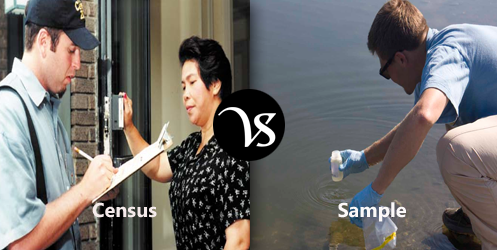 Census:
Census:
Census is the periodic collection of information from the entire population. It is a time consuming process. The data which has been collected from the census is reliable as well as accurate. A census allows the government to collect all the necessary information. The researcher could gain the accurate information.
Sample:
Sampling is the study of the few selected items rather than a large units. The small selection is called sample. The sample has been classified into various types such as: simple random sampling, stratified sampling and sequential sampling. It is not time consuming. Sample is the most convenient method to collect the data about the population.
Differences:
| Basis | Census | Sample |
|---|---|---|
| Definition (www.oxforddictionaries.com) |
An official count or survey, especially of a population. | A small part or quantity intended to show what the whole is like. |
| Objectives/Purpose | The objectives of the census are:
|
The objectives of sample are:
|
| Synonyms | Poll, enumeration, demography, statistics and demographics | Inspect, examine, sip, savor and test |
| Types | Its types are:
|
The types of sampling are:
|
| Word origin | The word census was originated in the early 17th century from Latin. | The word sample was originated from Middle English, from Anglo Norman French variant of the Old French essample ‘example’. |
| Reliability | Data from the census is reliable and accurate. | There is the margin of error in data obtained from sampling. |
| Time | Census is very time consuming. | Sampling is quick. |
| Convenience | Census is not very convenient as the researcher has to allocate a lot of effort in collecting data. | Sampling is the most convenient method of obtaining data about the population. |
| Pronunciation |
|
|
| Cost | Census is very expensive. | Sampling is inexpensive. |
| Advantages/Benefits | Its advantages are:
|
Its advantages are:
|
| Disadvantages | Its disadvantages are:
|
Its disadvantages are:
|
| Example in Sentence |
|
|





